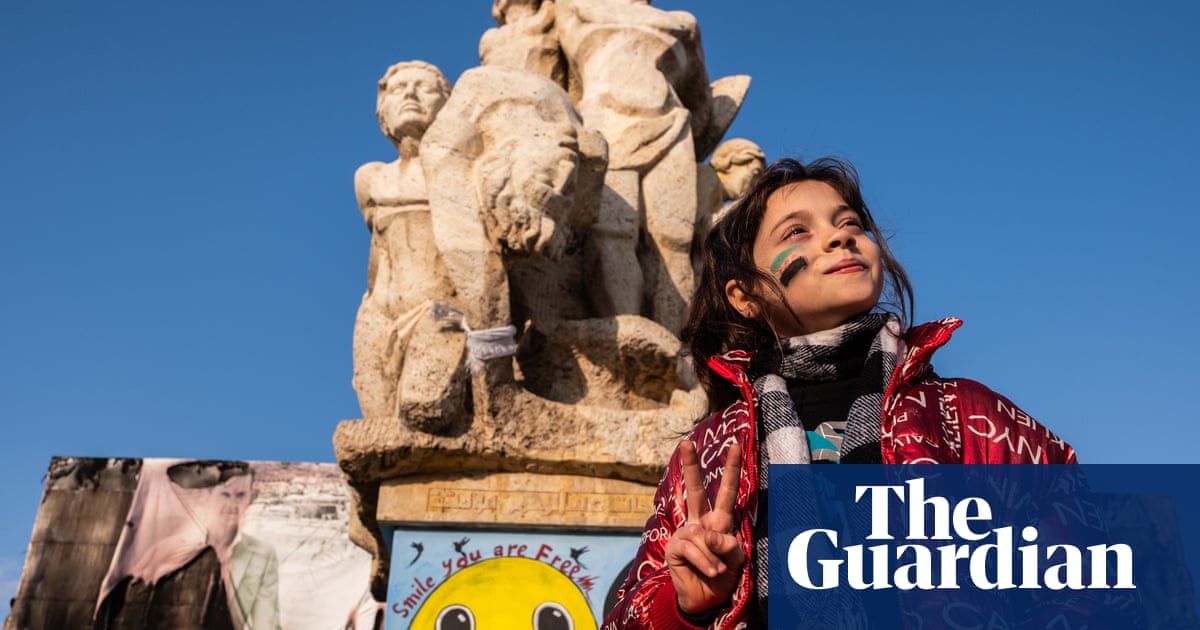Nasma and Haleem Kawas met during the first protests in Aleppo against Bashar al-Assad’s rule. In the early days of the 2011 Arab spring, the pair locked eyes at a demonstration calling for the president’s overthrow. Now after 13 years of conflict, broken dreams and exile, the couple are planning their return.
The Kawases have lived just two hours from Aleppo in the Turkish city of Gaziantep for almost a decade, only able to visit their home town in their dreams. And even then, said Haleem, these were always punctuated with memories of being chased through the streets by Assad’s security forces as they did during those early protests.
Thoughts of returning were also a distant dream until they saw pictures of insurgents approaching the edge of Aleppo. Change was coming, they decided. They called Haleem’s mother who was cooking in the family home in the west of the city.
“Why don’t you make a dish we like,” Nasma told her, hinting at the idea they could soon be arriving for dinner. All three burst into tears.
Little more than a week after capturing Aleppo, insurgents swept into Damascus, abruptly ending Assad’s 24 years in power as his fearsome regime crumbled around him. Rebel forces threw open the doors of the state’s infamous detention facilities as thousands of detainees, held for even the most minor forms of dissent, streamed into the streets.
Within hours the reign of the Syrian leader, often referred to as “the butcher of Damascus”, was over and Assad fled the country, a frantic conclusion to his family’s control of Syria that lasted almost half a century.
“This is the end Assad deserves,” said Nasma. “Syrians broke other Syrians out of prison. Our dreams couldn’t match what we’re seeing now. Even two weeks ago we were saying we hoped that someday our son or maybe even his kids would be able to rebuild Syria again. But this changed everything.”
The dramatic fall of one of the world’s most brutal dictators rippled across the entire Middle East, a reminder to many who joined the the Arab spring uprisings that the rule of autocrats in power across the region may ultimately prove fragile.
The popular protests that ousted dictators in Tunisia, Egypt, Syria, Libya and Yemen in 2011 have since been crushed under wars and counter-revolutions. But as statues of President Assad and his late father, Hafez, were ripped down by crowds across Syria, it marked the end of a chapter that Nasma, Haleem and their fellow activists began 14 years ago.
“The idea of autocratic sustainability has taken a hit,” said the writer and activist Iyad el-Baghdadi. “I’m looking at Egypt, at Saudi Arabia and all of their attempts to quell the voices of their people. All of these are going to come to an end, because dictatorship is ultimately unsustainable.”
Assad’s own people had lost faith in him, said Baghdadi, and the same breakdown of the social contract could occur elsewhere in countries such as Egypt, where growing numbers are struggling amid austeritys and rising poverty. Images of people freeing other citizens from prison, he said, reminded him of the earliest images of the Libyan uprising in 2011.
“The slogan of the Syrian regime was forever Hafez al-Assad,” he said, in reference to Bashar’s father who ruled Syria for decades before him. “Today we see that even forever comes to an end.”
From inside his own cell in a desert facility outside Cairo, the Middle East’s most prominent prisoner of conscience, the British-Egyptian activist Alaa Abd el-Fattah “will be thrilled to see the images of families reuniting”, after their escape from the darkness of Assad’s jails, said his sister Sanaa Seif.
Even so, Seif added that the real lesson is for Middle Eastern dictators, as well as their backers in European capitals. The Egyptian president, Abdel Fatah al-Sisi, “should take note that brutality and oppression are not sustainable, and the ending could be ugly for everyone,” she said.
Nasma and Haleem say their relationship was sparked after the protests against Assad’s rule began. They stayed in touch during the siege of Aleppo, and after Nasma moved to Turkey and Haleem remained in the city as it was pummelled by Russian and Syrian airstrikes. Trapped in the eastern side of the divided city and unable to see his family or Nasma, he scrawled love notes and poems on the walls of their home town and sent her pictures of his work.
When Haleem was forced out of Aleppo on the infamous green buses used by the Assad regime to carry dissidents and opposition fighters to other parts of the country in 2016, he wept at the thought he would never return. The young couple held on to a dream to see their home town once more in their lives. Now they are planning to visit when they are able to cross the Turkish border, weighing a more permanent move, with Haleem planning to open a local radio station.
They remain cautious about what life might be like under the rule of the Islamist group Hayat Tahrir al-Sham, particularly as Haleem still fears for a friend who has been held incommunicado by the group during its former iteration as an offshoot of al-Qaida.
Still, they said, they are equally confident that the people of Aleppo and its network of hardened activists are unlikely to bow to conservative Islamist rule even with HTS’s promises to devolve control to a local administration.
“If we can get rid of Assad, anything else is possible,” said Nasma.”

